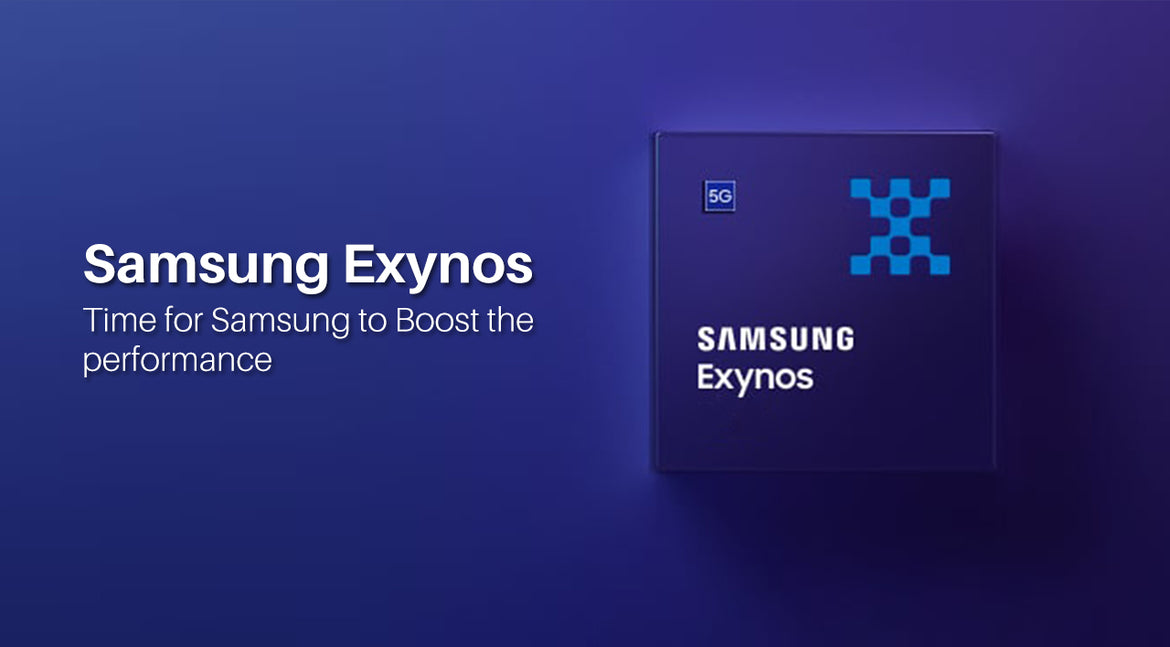
Samsung Exynos getting back on the performance track
- android, Exynos, samsung, Snapdragon
- 18 Nov, 2021
Samsung redefining their Processors - Exynos major comeback
Performance plays a major role while purchasing a new smartphone or tablet. A processor, or System-on-Chip (SoC), is the brain of every smartphone. Samsung has been at the front of innovation when it comes to delivering higher performance and better power efficiency. Samsung came up with the Exynos processor to enhance user experience. Exynos-powered devices run smoothly with little or no lag allowing the device to function to its fullest capacity. Samsung appears to have a lot of faith in Exynos chipsets for 2022.
Smartphone manufacturers are quickly hopping on the trend of designing their own processors. Along with Samsung, there are a few other smartphone brands that are making their own chip. Even the leading smartphone maker Apple has come up with chips such as the A12 Bionic. Chinese smartphone maker Huawei came up with Kirin 980 which is an artificially intelligent chip. Having an in-house processor gives the tech company a competitive advantage due to the customizability of processor cores.
Why Exynos chipsets weren’t able to perform?
Since 2011, Samsung has been using its own in-house Exynos chips on various smartphone models. However, the Exynos chip soon went through a downfall. The noticeable downfall began with the slightly more sluggish performance starting with the S9. The issue with the processor got worse when these problems started leading to overheating and more. This in turn led to thermal throttling and overall slower performance a result of it. Samsung’s chips are less efficient when it comes to RAM management also. The battery life and efficiency of the smartphones also went up for a toss with these issues. Customers started questioning the high-end smartphones by Samsung that did not have a high-end processor. Samsung noted these problems with its processor and soon turned towards improving it.
Will Exynos be better in snapdragon chipsets in the future?

While Exynos is Samsung’s in-house processor, Snapdragon SoCs are being manufactured by Qualcomm for use in third-party mobile devices. The Exynos processors have faced defeat from the Qualcomm Soc in terms of GPU performance and by a considerable margin. Qualcomm’s flagship processors have enjoyed the upper hand over high-end Exynos chipsets when it comes to GPU power and efficiency. However, the gap is narrowing now.
The Exynos 2100 is slightly better than Snapdragon 888 when it came to CPU performance. Samsung’s previous high-end chipset was the Exynos 990 which received a lot of criticism in the market. The Exynos 990 was said to have increased power consumption and decreased graphics performance compared to Qualcomm’s best at the time. Samsung is turning the tables now and it seems the new Exynos will not be disappointing users like the previous ones.
New Exynos and AMD GPU for flagship smartphones

AMD's RDNA 2 graphics architecture will be used in the next flagship Exynos chipset from Samsung. The AMD GPU in Samsung’s Exynos processor will likely offer massive performance improvements over the Mali-G78MP14 on the Exynos 2100. Samsung also claims that it will offer ray tracing support. Ray tracing technology is an advanced graphics display technology supported on desktop GPUs.
The collaboration can take the Exynos chipset a step closer to powerful performance with fast and reliable connectivity. Samsung also expects to apply this partnership to more product projects, such as smart car systems that require higher computing performance. As for AMD, by collaborating with Samsung, Radeon GPU technology can be further extended to the mobile device market.
Conclusion
Designing custom chipsets can enable features unique to the company ecosystem. This improves the performance of the device along with an enhanced user experience. Samsung processor has a long way to go with the Exynos chipsets. It is observed that smartphone users are demanding more connectivity which is becoming a hot topic for the future of mobile computing. Exynos processors have integrated 5G cellular modem and diverse connectivity features for faster and reliable communication along with data transfer. However, making a few changes in the Exynos chipset will solve major issues





























